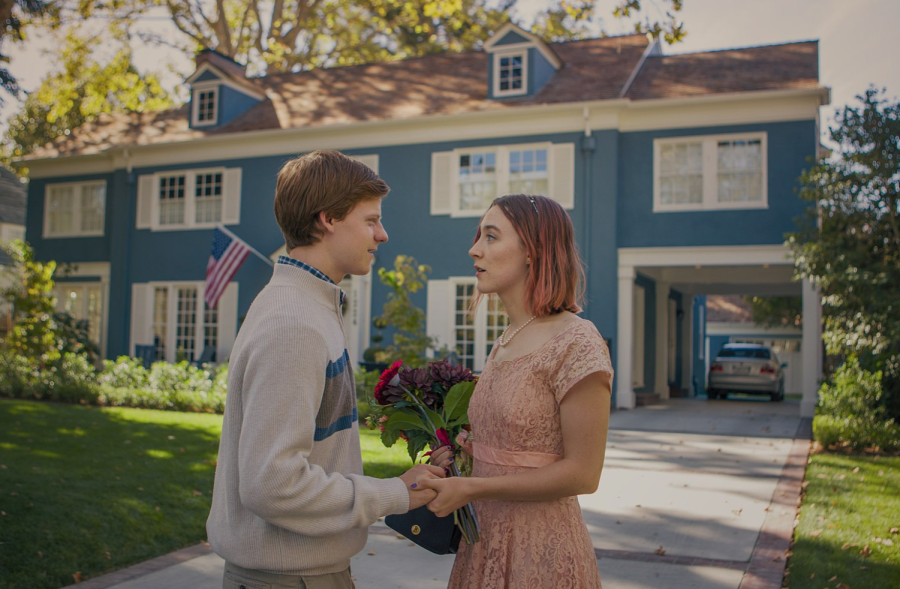Op -Counter Op: Lady Bird
Lady Bird, a 2017 coming-of-age movie, is about Lady Bird MacPherson, a head-strong, stubborn, self-absorbed teenager attending a Catholic high school in the early 2000’s. She struggles with finding her place in her city, her school, and her family. She lives with her family, notably her hard-working, tough-loving, and overly critical mother, Marion.
In Favor of Lady Bird: Patrick Ryan ‘24
Lady Bird lives in Sacramento, as she has her whole life, and she thinks very little of it. She lives with her father, her brother and his girlfriend, and most importantly, her mother, Marion, who is the antagonist of the movie and is written as something of a foil to Lady Bird, wanting to keep tradition, what she thinks is best for her family, in place. The film skillfully weaves Marion into the story, framing aspects of Lady Bird’s social life as the main plot of the film, when in the end, all the pieces fall into place. Lady Bird receives the letters her mother has been writing in secret. Her father gives them to her, wanting to show Lady Bird the care Marion has for her. Upon reading them, Lady Bird has an almost epiphanic moment of realization as to how deeply her mother cares about her, and that she feels the same. This all-at-once kind of experience is used frequently throughout the film and feels very genuine to how teenagers learn more about their world. These jolting realizations are often paired with quick cuts, which feel appropriate and clever, considering Lady Bird’s impulsive nature.
However, I believe the best piece of storytelling in the whole movie is in the final scenes. Lady Bird wakes up in a hospital bed, injured from a college experience the night before, and her first reaction upon rushing out of the hospital is to ask a stranger the day of the week. He tells her it’s Sunday, and she goes to find a church in which to go to Mass. This single act, the fact that a church is a place of solace for Lady Bird, tells so much about what she has learned about herself and gives relief to who she has become.
Lady Bird ultimately comes to learn that she loves her mother back, but this does not detract from her teenage rebellion. Her processing of feelings is still very real and affects who she is as a person. Her experiences of grief, love, and friendship are conveyed in an incredibly relatable way, and this familiarity is what makes the movie so special. The movie does an incredible job of telling a story of social and familial tension and resolves it in a familiar yet unique fashion.
Against Lady Bird: Margot Schneider ‘22
Throughout this film, protagonist Lady Bird passes many traditional coming-of-age, teenage landmarks including a first relationship, a falling out with her dear friend, controversial college applications, prom and graduation, and a struggle to find her community in both a judgmental school environment and a city (Sacramento) in which she cannot find a sense of home and belonging.
Admittedly, this movie does use many artful tactics to convey the passage of time and subtle expressions of love, pain and anger, conflict, and maturity such as lighting, abrupt cut scenes, depictions of seasonal change, and rapid shifts in mood and attitude. However, a movie should not rely on these things alone. I believe that Lady Bird, unfortunately, does so, and is missing key elements of plot and resolution.
Throughout the course of the story, Lady Bird, who so intently tries to defy the status quo of her peers through her speech, appearance, and behavior, falls victim to aggressively bland, overdone, and overtly unoriginal, stereotypical teenage tropes. Director Greta Gerwig tries to bring nuance to her film through artistic, intimate, and emotional portrayals of complex, frankly unlikeable characters. With all this potential, Lady Bird goes on to fight with her best friend, succumb to the peer pressure of the ‘popular girl,’ be manipulated by her boyfriend, and bicker with her mother about a prom dress. The potential for the creative, empowered, feminist nature of this complex protagonist is carelessly squandered by a sub-par plot.
In the end, Lady Bird manages to get accepted into a college in New York City and moves across the country. Upon her departure, Marion refuses to walk her out of the car and gives her only short, unsentimental responses to her parting, pained daughter. It takes her about five minutes to realize that she has made a horrible mistake, so she chases after Lady Bird only to realize she has lost her to airport security in a matter of seconds. Not only is this scene painfully frustrating, but it is also, unfortunately, cliché compared to the skillful and natural subtleties of the entire rest of the movie.
Lady Bird has a very interesting relationship with Catholicism. She attends a traditional Catholic high school, so her school career features numerous scenes involving prayers, Mass, and stereotypical Catholic cinematic tropes like strict abortion and relationship policies. Religion permeates into other facets of her life, although she angrily rejects them in efforts to establish her individuality, and in some ways, a personal sense of secularity as well.
However, Lady Bird has a discouraging start to her college days by getting alcohol poisoning and being sent to the hospital. In order to process this traumatic night, she resorts to the local Sunday morning church service to find a sense of home in the familiarity of religion that she spent her first 18 years denying. Furthermore, she proceeds to call her family and introduce herself as Christine, the name they gave her at birth. After achieving her short-term but passionately sought-after life goal of moving to New York for college, Christine loses the sense of originality that was so crucial to her character preceding this. Both she and her mother work unimaginably hard to attain this life step and current status, yet Christine feels even more lost, insecure, and alone than before. That, and she isn’t even on speaking terms with Marion, so there is no potential for resolution. The movie just ends, leaving both the viewer and the protagonist feeling dreadfully empty – an utterly unsatisfying end to an anticlimactic story.




























